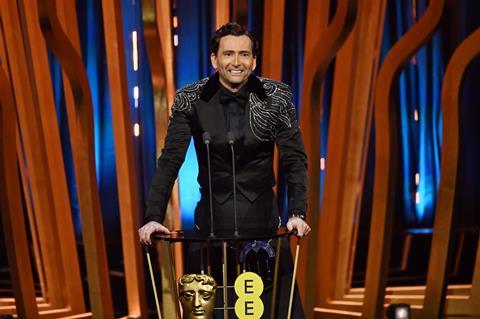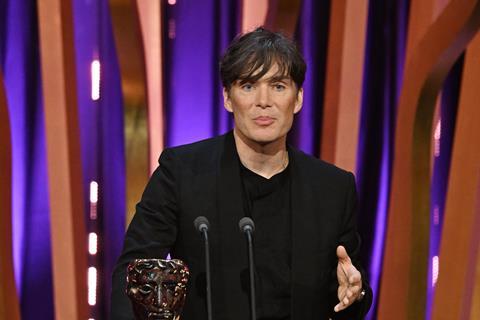
The cinematic magic of 2024 spread itself all over the Bafta ceremony.
So high was the creative bar it was evident the films that didn’t take home awards – Killers Of The Flower Moon, All Of Us Strangers, Barbie – would have won in any other year. Those that did triumph, and the ceremony itself, showcased the holy grail Bafta has been chasing for decades: a global, multi-cultural Britain, star-studded and expansive, from Prince William to David Beckham to European co-productions and US productions produced by Brits, to Irish actors and French writers and Hollywood glamour and Michael J Fox. The Zone Of Interest winning best film not in the English language and best British film at the same time is a dream a post-Brexit Britain can buy into, at least for one night.
Experience and knowledge of risk-averse financing conditions indicate this grail may vanish again, but for one night at least it’s good to celebrate the surprisingly healthy box-office returns in the UK for all the productions honoured and hope this market change will be permanent.
Perennially accused of being a pallid Academy Awards, Bafta found its place somewhere between the silliness of David Tennant and Michael Sheen and ‘Bark Ruffalo’ the dog, Hugh Grant’s bizarre Oompa Loompa ditty, Sophie Ellis-Bextor’s lithe dance anthem, Hannah Waddingham’s moving vocal tribute to those we have lost and Bafta honoree Samantha Morton’s powerful tribute to those, like her, who have found themselves stranded in the UK’s broken care system. Bafta 2024 may have been a one-off, but it was certainly no sell-out. (Although an incomprehensible routine by Nick Mohammed playing a character called Mr Swallow should never have made the live show, let alone the TV cut.)
Tennant’s confident hosting made for a more upbeat tone than recent MCs. Bafta has struggled to find a replacement for the much loved Stephen Fry, lurching from Joanna Lumley to Richard Ayoade to Rebel Wilson and last year’s nerve-ridden Richard E Grant. Tennant’s professionalism saw him move forcefully from the jokes that didn’t land to the ones that did with equanimity, driving the show and managing the stage on occasions where it was needed.
Given the febrile nature of the world right now, the show was decidedly, and surprisingly, apolitical, with a few small exceptions. Tennant wasn’t there to offend, and his being Scottish also helped cover the public-school luvvie pothole into which Bafta can often pitch. Viewing peaked at 3.8 million in the UK, low for a Sunday night and historically still low for the Bafta Film Awards, but respectable and a decent achievement given the BBC announced the winners as the ‘delayed-live’ show was still going on.

The main awards on the night went to Oppenheimer including best film, the UK director Christopher Nolan and Irish actor Cillian Murphy. Seen in another light, for example the Oscars in March, this might read more American and a triumph for Universal. But the multi-cultural nature of the production – including JR Oppenheimer’s own European roots – blended with the overall tone of the evening to reinforce the sense of global Bafta.
The Zone Of Interest, a UK-Polish co-production with a German cast – and a remarkable cultural and physical achievement to actually finance and produce in Poland apart from its clear artistic merit – was rewarded by being deemed British and international by Bafta voters, having it every way.
Poor Things, taking best actress for Emma Stone, production design, visual effects, costuming and make-up and hair, had previously seemed like a tenuous inclusion in the outstanding British film category. But as its representatives took to the stage, a story of Searchlight, Irish/UK production company Element, and a deservedly-recognised UK craft department working in Hungary became clear.
Anatomy Of A Fall took one Bafta, but the important one of best original screenplay for writers and real-life partners Justine Triet and Arthur Harari, the most naturally funny recipients on the night.
Bafta had other key gifts to hand out – to The Holdovers (Da’Vine Joy Randolph in supporting actress) and Cord Jefferson for adapting American Fiction – although nothing for the behemoths that were Barbie and Killers Of The Flower Moon, which will possibly be a point of division with the Oscars on March 10. And nothing at all for All Of Us Strangers, Andrew Haigh’s affecting film which missed out on a key best actor nomination for Andrew Scott in the jury process, and didn’t convert any of its six nominations to Bafta ‘gold’. There’s Bafta gold, though, there’s the gold-dust that sprinkled the stage at the 2024 ceremony – and then there’s the real gold that you can see in today’s box-office report.
That shows an incredible upsurge in the arthouse market in the UK. The figures don’t lie: £8.1m for Poor Things; £4.5m for All Of Us Strangers; £1.8m for The Zone Of Interest; £1.8m for Antatomy Of A Fall. Oppenheimer isn’t arthouse, true, but it’s not easy viewing either, all three hours of it. Add £59m into that mix from producers Nolan, Emma Thomas and Charles Roven.
Because for all the winners last night, Bafta included, there is one clear champion – and that’s the resurgent UK filmgoing public, long may their appetite for the unusual and the unexpected continue.
















![[L-R]: Amanda Villavieja, Laia Casanovas, Yasmina Praderas](https://d1nslcd7m2225b.cloudfront.net/Pictures/274x183/6/4/1/1471641_pxl_20251224_103354743_618426_crop.jpg)













No comments yet